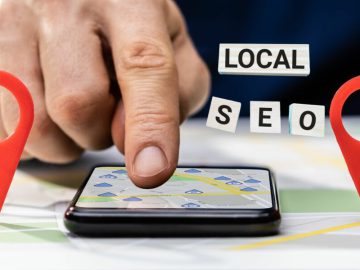Sometimes the best way to advertise your business is through word of mouth. But in an increasingly digital age, how do you get your message out there? One easy (and free) way to tell the world about your business is by adding it to lists of local businesses – otherwise known as business directories.
Customers can then browse for the goods and services they need in their local area – as well as leaving reviews for other potential customers to find.
Keep reading to see a breakdown of the most popular online business listings and how they could help your business.
What is a business directory?
A business directory is a convenient list for potential customers to find a business. In the UK, this would have historically been in the form of the Yellow Pages – but thanks to the internet, there are plenty of free online business listings you can add your small business to.
If you join a business directory, you’ll often need to provide the following information:
- business name and contact information: let people know how to best contact you by including your company name, address, phone number, website, email address, or social channels
- description of what you do: list the products and services you offer
- industry: this is so customers can better find what they’re looking for – whether you’re a restaurant, tradesperson, or photographer
- location: most people use business directories to find businesses local to them, so make sure to list this
- opening hours: so people know when they can visit or get in contact with you
Additionally, certain business directories allow customers to add reviews and ratings – so it’s important to maintain a good reputation.
Why use business listings?
But how can a list of local businesses be useful for small business owners?
- free marketing: adding your business in different business listings can help potential customers find you online
- local SEO: being included in a list of local businesses can boost your website’s ranking in local search results (we’ll talk more about local search engine optimisation later in this guide)
- reputation management: opening your business up to customer reviews can show how reputable you are – as well as potentially convincing new customers to try your business
Ultimately, joining business listings is a great way to market your business. Find other ways you can market your business for free in our guide.
Business listings in the UK – where to list your business
Now that you know what business listings are, as well as why you should use them, it’s time to add yourself to one – or ten. Each business directory will have a different user base, so the more you add yourself too, the wider audience you can reach.
To help you make a decision, we’ve broken down some of the most popular United Kingdom business directories into smaller categories.
Business listings on popular platforms
The following aren’t what you’d typically think of when you think of business listings, but that doesn’t mean they aren’t. While audiences may be using the following platforms for directions and general searching, they still work as a great way to promote your business to a wider audience.
Apple Maps
While you may typically think of Apple Maps as a tool for getting directions, it’s also considered a business directory in its own right. And as it’s included on all Apple devices as default, it has a built in audience waiting.
To claim or add your business on Apple Maps, you’ll need to sign in with an Apple ID. Make sure to search for your business before creating the listing yourself to see if it already exists on the platform – as having two listings with different information can be confusing for users.
Benefits of Apple Maps:
- built-in customer base who use Apple
- GPS allows customers to find businesses nearby
- integrates with TripAdvisor reviews
Facebook is a popular social network but can also work as a business listing. That means you can use Facebook as part of your social media marketing strategy and as a free business listing at the same time.
We have a whole guide on how to create a Facebook Business account if you don’t have one already. But if you’re already actively using Facebook as a marketing tool and want to get the most out of it as a free business listing too, use this time to review your contact and business information.
Benefits of Facebook:
- 2.9 billion monthly active users (Statista)
- can also be used as part of your social media marketing strategy
- easily interact with your customers
- easy for other users to recommend and promote your page to their friends
LinkedIn is a popular platform for businesses – whether it be business to business (B2B) or business to customer (B2C). So if you’re a professional looking to attract clients or network with other businesses, it can be a great tool to use.
Check out or guide on how to use LinkedIn to promote yourself to get started.
Benefits of LinkedIn:
- people are using the platform specifically to network
- great for B2B and B2C
- easy to interact with your customers
- pages are optimised to appear in search results
Google is the world’s most popular search engine, which makes it a great platform to invest time into by creating a keyword rich, well-optimised business profile. We have a full guide on how to get Google reviews for your business, which also includes information on how to set up a Google Business profile if you don’t yet have one.
Benefits of Google:
- one of the largest user base of any online business directory
- Google Maps and Google Search integration
- easy to interact and reply to your customers
- optimised to appear in search engine results
Bing Places
While not as widely used as Google, Bing is still a highly popular search engine – receiving 1.2 billion visitors in 2022 (SignHouse). And as Bing is owned by Microsoft, it’ll often be the default option for those using Microsoft devices.
You’ll need a Microsoft account to claim or create your business listing – and you can even import a profile directly from Google, so it’s easy to feature in both business directories.
Benefits of Bing Places:
- integrated with Microsoft products
- optimised to appear in search engine results
Online business directories
The days of a business directory arriving on your doorstep may be gone, but online business directories live on. Below are a list of some of the most popular online directories and customer review sites.
Yell
The Yellow Pages may have ceased production in 2019 but the online version, Yell, is still available for you to use. Users can search by keyword and location, so make sure to list both on your profile so potential customers can find you.
Unlike the traditional Yellow Pages, customers are now able to leave reviews on companies so it’s a good idea to read up on online reputation management if you choose a business listing that features reviews.
Benefits of Yell:
- the original business listing with great domain authority
- no social media aspect if that’s not in your marketing strategy
Yelp
Yelp is an American company but is used as a business directory worldwide. The whole focus is on connecting customers with local businesses and highlighting customer reviews. When you visit the website with your location enabled, you’ll immediately see recent customer reviews for businesses in your area.
Benefits of Yelp:
- encourages interaction with customers
- a well-known brand and a popular website
- dedicated mobile app for business owners
Trade-specific business listings
If you want to go even more specific with your business listings, you can join a platform that specialises on your particular industry.
For example, if you run a restaurant, you might prioritise working on your listings for Just Eat, OpenTable, or TripAdvisor. Not only do users on these sites tend to be looking for businesses in your industry, but they often come with other benefits too. JustEat works as a food delivery service and OpenTable works as a reservation app.
There are specific business directories for tradespeople too. Listing your services on websites like Taskrabbit and Checkatrade allow you to promote your business and get authentic customer reviews for your work.
Benefits of local SEO
No matter which free business listing you choose, it’s important to optimise your listings for search. If you’re predominantly trying to reach customers in your local area, you’ll need to work on your local SEO.
A basic introduction is to use top-level search terms that reflect your business and area – such as ‘cleaner in Newcastle’ or ‘vegan bakery in Brighton’. But if you want to go more in depth, we have a whole guide on the best SEO tools for small businesses which you can use to identify the right keywords.
Alternatively, you can work with a specialist SEO company to develop your strategy. You likely won’t need to do this only for your business listings, but it could be useful if you have a wider digital marketing strategy in mind.
Another thing that could help to boost your standing on these business directories is to request customer reviews. Reach out to old customers who were happy with your work and see if they can leave you a review on their directory of choice.
Do you add your business to lists of local businesses? Tell us your favourites in the comments below.
Getting an online presence for your small business
Ready to set up your cover?
As one of the UK’s biggest business insurance providers, we specialise in public liability insurance and protect more trades than anybody else. Why not take a look now and build a quick, tailored quote?
Photo: Dasha Petrenko/stock.adobe.com




